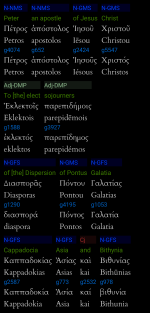You missed one:
[1Pe 1:3 KJV] Blessed [be] the God and Father of our Lord Jesus Christ, which according to his abundant mercy hath begotten us again unto a lively hope by the resurrection of Jesus Christ from the dead,
Here it is in the ESV:
[1Pe 1:3 ESV] Blessed be the God and Father of our Lord Jesus Christ! According to his great mercy, he has caused us to be born again to a living hope through the resurrection of Jesus Christ from the dead,
1) I mean, if you're going to nitpick, then I'm going to point out that the greek phrase used in John 3 in both verses is different than the phrase used by Peter in 1 Peter 1.
2) I quoted that verse in the very post you are responding to for a reason... the reason being is that they use the same phrase, which is different than the phrase used by John in chapter 3. The phrase in John I mentioned above is two words, as follows:
Strong's g1080
- Lexical: γεννάω
- Transliteration: gennaó
- Part of Speech: Verb
- Phonetic Spelling: ghen-nah'-o
- Definition: to beget (of the male), (of the female) to bring forth, give birth to.
- Origin: From a variation of genos; to procreate (properly, of the father, but by extension of the mother); figuratively, to regenerate.
- Usage: bear, beget, be born, bring forth, conceive, be delivered of, gender, make, spring.
- Translated as (count): begat (39), having been born (12), has been born (4), have begotten (4), were born (4), to be born (3), was born (3), be born (2), had been born (2), have been born (2), having been begotten (2), he begat (2), he was born (2), begetting (1), being born (1), born (1), did bear (1), has been begotten (1), having been conceived (1), having begotten (1), he has been born (1), he should be born (1), I have begotten (1), she bore (1), she brings forth (1), they breed (1), was to be born (1), we were born (1), will bear (1).
------------------
Strong's g509
- Lexical: ἄνωθεν
- Transliteration: anóthen
- Part of Speech: Adverb
- Phonetic Spelling: an'-o-then
- Definition: (a) from above, from heaven, (b) from the beginning, from their origin (source), from of old, (c) again, anew.
- Origin: From ano; from above; by analogy, from the first; by implication, anew.
- Usage: from above, again, from the beginning (very first), the top.
- Translated as (count): from above (6), top (3), from the first (2), anew (1), the from above (1). |
IOW, Jesus is preaching that Israel (cf Matthew 15:24)
must be "born from above" through water and spirit (John 3:5) to see/enter the Kingdom of God.
The one word in 1 Peter 1 means "to beget again, beget into a new life":
Strong's g313
- Lexical: ἀναγεννάω
- Transliteration: anagennaó
- Part of Speech: Verb
- Phonetic Spelling: an-ag-en-nah'-o
- Definition: to beget again, beget into a new life.
- Origin: From ana and gennao; to beget or (by extension) bear (again).
- Usage: beget, (bear) X (again).
- Translated as (count): Having been born again (1), having begotten again (1). |
He's saying (speaking to the Diaspora, those of the circumcision), not the Body of Christ, cf Galatians 2), that they now, through being "begotten again" have a hope that they did not have before. IOW, they went from their old life of having no hope, to a new life of having hope in what was to come, ie, the New Jerusalem where Christ would reign as King of Israel on the throne of David.
Here's a sampling of Paul talking about such hope, which refers to the resurrection, as you can see:
[Rom 8:24 KJV] For we are saved by hope: but hope that is seen is not hope: for what a man seeth, why doth he yet hope for?
[1Co 15:19 KJV] If in this life only we have hope in Christ, we are of all men most miserable.
[Col 1:5 KJV] For the hope which is laid up for you in heaven, whereof ye heard before in the word of the truth of the gospel;
This is an example of "[Israel] shall be saved in like manner as [the Body of Christ]" that you're trying to twist (likely unintentionally, but twisting all the same) into supporting the idea that Paul taught the same as what the Twelve taught.
The problem is that what Paul teaches has a different context to it than what the Twelve teach, including Peter's and John's writings.
The context of Paul's teaching has ALWAYS been a citizenship in heaven, not a citizenship on Earth in Israel:
For our citizenship is in heaven, from which we also eagerly wait for the Savior, the Lord Jesus Christ, who will transform our lowly body that it may be conformed to His glorious body, according to the working by which He is able even to subdue all things to Himself.
For our citizenship is in heaven, from which we also eagerly wait for the Savior, the Lord Jesus Christ,

www.biblegateway.com
Peter's (and Jesus') context is the Kingdom of Israel which Jesus Himself will rule from upon David's throne, in the New Jerusalem, that holy city that will descend from Heaven (that "incorruptible and undefiled" inheritance that "does not fade away" that is "reserved in Heaven" for Israel, who are "kept by the power of God through faith" (like manner as they (the Body of Christ)) "for salvation ready to be revealed in the last time"), as a bride adorned for her husband.
See above...Yes, we are brought back to life, but in hope of a future life.
Nope.
A life that we have currently. Our citizenship
is in heaven, not "will be."
We HAVE a life in heaven.
Either way, being brought to life is a synonym of being born. Being brought back to life is synonymous with being born again.
Saying it doesn't make it so.
So Paul is indeed talking about new birth,
Because you say so?
and the hope part of that new birth
Begging the question.
is for something that isn't yet experienced physically, but assured to us, because "hope that is seen (already experienced) is not hope".
The new life we get is, yes.
"New birth"? No. Notice how you have to force "new life" to mean "born again/rebirth/new birth/etc." You're eisegeting, reading your beliefs into the text.
Let Scripture speak for itself, take it for what it says at face value.
But Paul uses a similar phrase, here:
[Tit 3:5 KJV] Not by works of righteousness which we have done, but according to his mercy he saved us, by the washing of regeneration, and renewing of the Holy Ghost;
Regeneration is not "born from above" or "begotten unto a new life."
That word from Strong's:
Strong’s Definitions [?](Strong’s Definitions Legend)
παλιγγενεσία paliggenesía, pal-ing-ghen-es-ee'-ah; from
G3825 and
G1078; (spiritual) rebirth (the state or the act)
I don't see EITHER of those words (G3825 or G1078) in Titus 3:5, particularly the latter.
I do, however, see G3824:

Strong's g3824
- Lexical: παλιγγενεσία
- Transliteration: paliggenesia
- Part of Speech: Noun, Feminine
- Phonetic Spelling: pal-ing-ghen-es-ee'-ah
- Definition: a new birth, regeneration, renewal.
- Origin: From palin and genesis; (spiritual) rebirth (the state or the act), i.e. (figuratively) spiritual renovation; specially, Messianic restoration.
- Usage: regeneration.
- Translated as (count): of regeneration (1), regeneration (1). |
And here's what Paul is talking about (following verses):
[Tit 3:6 KJV] Which (the washing of regeneration and the renewing of the Holy Ghost) he shed on us abundantly through Jesus Christ our Saviour;
[Tit 3:7 KJV] That being justified by his grace, we should be made heirs according to the hope of eternal life.
The NKJV makes the passage a bit clearer, and does not support your parenthetical.
But when the kindness and the love of God our Savior toward man appeared, not by works of righteousness which we have done, but according to His mercy He saved us, through the washing of regeneration and renewing of the Holy Spirit, whom He poured out on us abundantly through Jesus Christ our Savior, that having been justified by His grace we should become heirs according to the hope of eternal life.
But when the kindness and the love of God our Savior toward man appeared, not by works of righteousness which we have done, but according to His mercy He saved us, through the washing of regeneration and renewing of the Holy Spirit, whom He poured out on us abundantly through Jesus Christ our...

www.biblegateway.com
The Holy Spirit was poured out. Not "the washing of regeneration and the renewing of the Holy Ghost." It's THROUGH His being poured out on us that we are washed and renewed.
Those things, the washing and renewing, sure sound like being born again, this time of the Spirit.
But not of water. Remember, Jesus said "born from above" via "water AND Spirit."
A CRUCIAL difference.
Being born again, this time from above, is kind of like being born of the Spirit, after being born of water, don't you think?
No.
Born from above means "being baptised with water and the Spirit, and is used ONLY in the context of Israel and her new covenant with God (ie, the four gospels, Acts 1-8, and everything from Hebrews onwards). Israel is washed of their sin in Christ's blood (the Blood of the Lamb, which has symbolic significance for Israel), as their New Covenant required the death of the testator for it to come into effect (Hebrews 9:6).
On the other hand, the Body of Christ is washed by the Holy Spirit, the "regeneration and renewing of the Holy Spirit."
Quite a huge difference.
We are washed with the Holy Spirit alone through Christ's death, while they are washed with Blood, and must be baptised in water and with the Spirit.
There are similarities between the two groups, but things that are different are not the same. IOW, just because there are similarities doesn't mean you can ignore their differences.
Thus "born again" applies, as you said.
Only figuratively, at best.
I'm sure I'm not prepared to settle the age-old discussion of what being born of water and spirit means, but at least a few people (maybe quite a few) believe that the "water" part refers to the first birth, since we come of the amniotic fluid of the mother's womb.
So what?
Nowhere in scripture does it say that ANYONE, let alone Israel or the Body of Christ, should be or was baptized in amniotic fluid.
What an odd claim.
No, there were plenty of instances of WATER baptism
S (PLURAL!) in Hebrew culture.
Paul seemed to think it did.
Because you say so?
Book chapter verse!
OH WAIT! You can't provide that, because you're claiming to know what Paul thought, rather than what he actually said!
NOWHERE does Paul use the term "born again," and for good reason! He didn't want to confuse believers! Instead, he uses phrases like "put off the old man ... put on the new man
who is renewed in knowledge according to the image of Him who created him, where there is neither Greek nor Jew, Circumcised nor uncircumcised, barbarian, Sythian, slave nor free" (Colossians 3) and "if anyone is in Christ, he is a new creation, old things have
passed away; behold, all things have become new" (2 Corinthians 5) and "For since by man came death, by Man also came the
resurrection of the dead. For as in Adam
all die, even so in Christ
all shall be made alive" (1 Corinthians 15).
The language he uses talks about life from the dead.
The language Jesus and Peter and the Twelve used talks about a new life, as thought born again.
No, I suppose He didn't there, at least not openly.
He did not. Period.
There is no room for your interpretation.
But He also chastised Nicodemus for not understanding this already, and He coupled it with "everlasting life", which we aren't fully immersed in until after the resurrection.
"Everlasting life" in the coming Kingdom of Israel.
Not "everlasting life" in Heaven.
And remember that Jesus didn't know whether Nicodemus was one of the "good guys" or one of the "bad guys" yet. So I can see why He wouldn't tell him everything.
Nicodemus was a Pharisee, a ruler of the Jews, part of the flock Jesus came to save, and someone who came to him at night to ask Him questions, meaning he probably didn't want the other Pharisees to know he was associating with Christ.
I'd say that puts him squarely in the middle, between Jesus and the Pharisees, if not slightly towards Jesus' side.
Right. The bolded parts above speak of our incorruptible inheritance in heaven, compared to God "which lives and abides forever";
No, it doesn't.
Addressed above, re: New Jerusalem
then Peter contrasts that new thing (which is incorruptible and abides forever) with the old thing, our flesh which withers and dies.
That's not what he did at all... Supra.
Peter is indeed speaking of resurrection to our incorruptible bodies, just as Paul did.
Saying it doesn't make it so.
[1Co 15:52 KJV] In a moment, in the twinkling of an eye, at the last trump: for the trumpet shall sound, and the dead shall be raised incorruptible, and we shall be changed.
Not quite the same topic, I'm afraid.
We're talking about the difference between being born again and being made alive again, not what will happen to ALL believers, both of the New Covenant and of the Body of Christ.
[Eph 1:13 KJV] In whom ye also [trusted], after that ye heard the word of truth, the gospel of your salvation: in whom also after that ye believed, ye were sealed with that holy Spirit of promise,
[Eph 1:14 KJV] Which is the earnest (because we don't yet have the final thing) of our inheritance until the redemption of the purchased possession, unto the praise of his glory.
So what is the "inheritance" Paul speaks of?[/QUOTE]
Answered a few verses earlier in that chapter:
"being predestined according to the purpose of Him who works all things according to the counsel of His will,
that we who first trusted in Christ should be to the praise of His glory." (vv. 11b-12)
[1Co 15:50 KJV] Now this I say, brethren, that flesh and blood cannot inherit the kingdom of God; neither doth corruption inherit incorruption.
True of both groups.
That doesn't make the two groups the same group.
Hence why ALL will receive new bodies.
Oh, and the "Kingdom of God" is... "bigger," for lack of a better word... and includes as a part of it, the coming "Kingdom of Israel," AND the Body of Christ who will reside in Heaven.
But only one born of the Spirit may inherit the kingdom of God, one that is incorruptible, or unable to die again, because he is already resurrected.
Supra.
Indeed, cf the above.
Synonymous, supra.
Saying it doesn't make it so, Derf.






